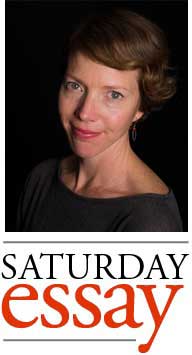Hillside Breeders
“Ooohh, Poppy’s going to do it!”
Poppy is our seven year old’s Mini Rex doe rabbit. Poppy has a date with a buck named Frodo with velvet black fur and a dwarf gene. I hadn’t seen him in-person, but his owner up the hill texted me his photo. Electronic match-making extends to other species, too.
“Wait, Nibbit,” the ten-year-old asked her little sister, “Do you even know what ‘do it’ means?”
“Uh, well. Not exactly.”
I thought we had already gone over this, or I assumed the eldest would have filled her in. So much slides with a second child. It was time for dinner, so over tacos I described ovulation, intercourse, fertilization, implantation, etc. I couldn’t tell if the seven-year-old’s eyes were glazing over with boredom or embarrassment.
Her father Jeremy knows that if you want to get a kid’s attention you light up a screen. He found a video of rabbits mating. It is actually worth watching. Forgive me for the spoiler, but when the buck comes he actually goes into a momentary trance and falls over.
We didn’t intend to breed rabbits, much less pedigrees with papers. It just happens to be the kind the ten-year-old fell in love with last summer in her friend’s former nanny’s yard. A litter was weaning just in time for her birthday and she begged for the mottled runt with a saddle-like splotch on his back. His curly striped whiskers made her weep with joy. We relented. She named him Pinky.
Six weeks later, Pinky’s mom weaned another litter just in time for our second daughter’s birthday. She, too, chose the smallest with white fur and black spots. She named her Poppy.
Now we had to get one fixed or keep the rabbits separated forever. Fixing would cost $300 a pop, so from scrap lumber, Jeremy built a duplex hutch with identical floorplans. Each apartment had a dining room, enclosed bedroom, loft with a view, and two doors secured with a hasp and mini-carabiner to keep predators out.
When it got cold he moved it up against the garage, cut holes into the back of the hutch and into the garage, suspended a divided insulated box from the rafters, and connected the indoor and outdoor bedrooms with two venting tubes. Then we bought heated water dispensers for $45 each. When one broke we bought a new one.
When it got even colder, Pinky and Poppy moved into our living room. We trained them to use a litter box, but they kicked the granules everywhere. Then they took turns hopping around outside their portable cages, laying across the girls’ laps, and depositing raisinettes under the couch.
One weekend a friend who lives near Grand Marais housesat for us. We have long admired his family’s 80 acre farmstead, especially the way the goats, chickens, and firewood business have given their children an earthy wisdom and strong work ethic. But on this particular weekend the dad wanted a slice of city life on the Duluth Hillside. We told him to never let Pinky and Poppy interact, even for a second. His note read:
“You told me to put the bunnies in the same cage, right?” Would pay-back for Jeremy’s practical jokes arrive in the form of up to ten adorable inbreds? Four weeks later we sighed relief: no kits.
Come spring, back outside, Poppy developed a plush roll of fat around her neck called a “dewlap”: bunny décolletage, if you will. She growled whenever we cleaned her cage. She bit, too, but only gently. Then she started to pull out her fur and build a nest. She was gaining weight even though she had spent plenty of time in the “run,” an fenced-in rectangular playground for exercise and digging.
Wait. Perhaps we should have better supervised her time in the run. Our yard is loitered by wild rabbits the girls have named Fiver, Hazel, and Dandelion from Watership Down. What if Fiver jumped the chicken wire while Poppy’s chaperones were inside playing Minecraft? This possibility excited the girls. Then I said we wouldn’t keep the babies.
“Why?”
“They’d be half-wild. They might bite and be infected with some kind of disease.”
“What? You’d kill them?”
“I didn’t say that—we just wouldn’t keep them.”
“Where would they go? Who would take them?”
Good question. I remembered The Park Point Rabb-pocalypse of 2012, when someone released their Easter bunnies into the wild. In just a few months, the offspring quadrupled the human residents of Minnesota Avenue. Nary a homegrown vegetable survived. Some residents used poison, others proposed a reintroduction of natural predators, while others set live traps to help the buns find forever homes. Neighbor turned against neighbor in a kind of rehearsal for the Trump Era. Somehow the infestation subsided.
Truth was, I wanted salable pets. Maybe a few pure-bred Mini Rexes could help us recover some money we spent. We already had a short list of interested buyers.
The ten-year-old looked at me like I was a stranger.
“Calm down,” Jeremy said. “There’s no way Fiver could have knocked up Poppy because domestic rabbits and Cottontails can’t interbreed. The embryos can’t survive.”
But how could we be sure that Fiver was a Cottontail? What if his parents came from the other side of the Lift Bridge?
Within a few days Poppy stopped pulling out her fur. Once again we, we sighed relief. We learned that does can experience a “false pregnancy” when they smell a buck nearby. She was lonely. It felt almost cruel to deny her destiny.
On the day of Poppy’s date with Frodo we load her into her cage to visit him. If he visited her, we learn, she would likely kick his velvety ass. Moreover, my friend Anne remarks that we should not call it a “date” unless we want our daughters to assume that pregnancy is the desired result of a scheduled encounter with someone of the opposite gender. She is right, of course. Words matter.
The encounter does not take long. Frodo mounts, pumps twice, bugs out his eyes, and falls off. Poppy hops away, looking irritated. One girl glances at a helicopter overhead and misses the whole thing.
I like to think that we didn’t have to move to the country to give the girls a farm experience. On our narrow lot just a few blocks up from the Shanty Bottle Shop, they wake before dawn to muck out stalls and toss hay by headlamp.
But as parents we can’t take full credit. Kids will find the world with or without us. Their proclivities and obsessions expose us to things we would never seek out ourselves. And now we are rabbit farmers.
Recommended Links:
Leave a Comment
Only registered members can post a comment , Login / Register Here














2 Comments
annefluke
about 6 years agobrandine
about 6 years ago